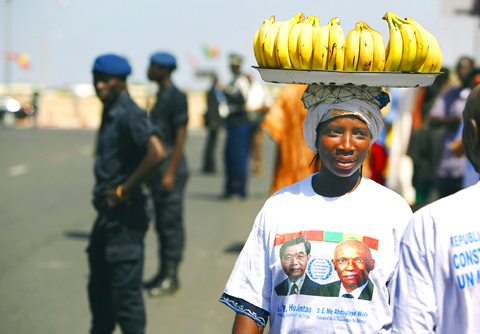China and Senegal signed five trade pacts on Friday as Chinese President Hu Jintao (胡錦濤) pressed on with an African tour to boost commercial ties and deflect criticism that Beijing exploits the world’s poorest continent.
According to the Senegalese presidency, the two sides inked a deal to set up a joint body to deepen economic, commercial and technological cooperation.
Under another pact, China extended loans for new buses. A third agreement was a contract for China to buy peanut oil, the presidency said, but did not say how much the deals were worth.

PHOTO: AP
Neither Hu nor Senegalese President Abdoulaye Wade spoke with reporters and no press conferences are planned during the visit.
Earlier on Friday, Hu spoke in Mali of the need for China to strengthen relations with Africa during this time of economic crisis.
“We are both developing countries facing the international economic crisis, we should strengthen our relationship. China will continue its aid to Mali,” he said at a foundation stone ceremony for a bridge on the River Niger in Bamako.
China is criticized in the West over its drive to secure natural resources from African states, including from regimes spurned by the West, and Hu has been anxious on his trip to push forward talk of investment and debt-relief.
China’s economy has boomed over recent years, driving oil and other commodity prices to record highs in a scramble for raw materials. The African continent has become a key focus in its efforts to secure supplies.
Beijing is often accused of giving little in return and Hu’s trip to four less resource-rich African nations — Mali, Senegal, Tanzania and Mauritius — has been seen as a move to counter such claims.
Official Chinese figures show trade between China and Africa jumped 45 percent last year, with Chinese exports to the continent up 36.3 percent and its imports, mainly oil, soaring 54 percent.
Western critics of China’s growing role in Africa accuse Beijing of acting in a colonial fashion, focusing only on its own interests, and dealing with outcast regimes such as in Sudan.
Beijing has strongly rejected such criticism, insisting that its involvement is even-handed and of mutual benefit to it and its African partners.
Although relatively small, Mali and Senegal still have significant resources.
Dakar and Beijing re-established diplomatic ties in 2005 after a 10-year hiatus over Senegal’s recognition of Taiwan. Hu’s visit is widely seen as a reward to Dakar for returning to the fold of its “one China” policy.
Hu was to meet senior Senegalese politicians yesterday morning before visiting the site of a new national theater being built with Chinese aid and going on to Tanzania. He will wrap up his tour in Mauritius.

With much pomp and circumstance, Cairo is today to inaugurate the long-awaited Grand Egyptian Museum (GEM), widely presented as the crowning jewel on authorities’ efforts to overhaul the country’s vital tourism industry. With a panoramic view of the Giza pyramids plateau, the museum houses thousands of artifacts spanning more than 5,000 years of Egyptian antiquity at a whopping cost of more than US$1 billion. More than two decades in the making, the ultra-modern museum anticipates 5 million visitors annually, with never-before-seen relics on display. In the run-up to the grand opening, Egyptian media and official statements have hailed the “historic moment,” describing the

‘CHILD PORNOGRAPHY’: The doll on Shein’s Web site measure about 80cm in height, and it was holding a teddy bear in a photo published by a daily newspaper France’s anti-fraud unit on Saturday said it had reported Asian e-commerce giant Shein (希音) for selling what it described as “sex dolls with a childlike appearance.” The French Directorate General for Competition, Consumer Affairs and Fraud Control (DGCCRF) said in a statement that the “description and categorization” of the items on Shein’s Web site “make it difficult to doubt the child pornography nature of the content.” Shortly after the statement, Shein announced that the dolls in question had been withdrawn from its platform and that it had launched an internal inquiry. On its Web site, Le Parisien daily published a

China’s Shenzhou-20 crewed spacecraft has delayed its return mission to Earth after the vessel was possibly hit by tiny bits of space debris, the country’s human spaceflight agency said yesterday, an unusual situation that could disrupt the operation of the country’s space station Tiangong. An impact analysis and risk assessment are underway, the China Manned Space Agency (CMSA) said in a statement, without providing a new schedule for the return mission, which was originally set to land in northern China yesterday. The delay highlights the danger to space travel posed by increasing amounts of debris, such as discarded launch vehicles or vessel

RUBBER STAMP? The latest legislative session was the most productive in the number of bills passed, but critics attributed it to a lack of dissenting voices On their last day at work, Hong Kong’s lawmakers — the first batch chosen under Beijing’s mantra of “patriots administering Hong Kong” — posed for group pictures, celebrating a job well done after four years of opposition-free politics. However, despite their smiles, about one-third of the Legislative Council will not seek another term in next month’s election, with the self-described non-establishment figure Tik Chi-yuen (狄志遠) being among those bowing out. “It used to be that [the legislature] had the benefit of free expression... Now it is more uniform. There are multiple voices, but they are not diverse enough,” Tik said, comparing it